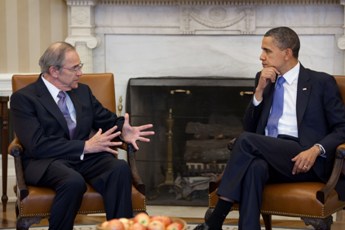Former US special envoy calls for more engagement with S. Sudan
January 8, 2014 (KHARTOUM) – The United States former special envoy to Sudans, Princeton Lyman, has stressed that the international community must act more robustly to assist South Sudan in becoming a viable state.
 Since last month, clashes erupted in South Sudan amid fighting among a group of soldiers in the capital, Juba. The violence quickly spread to other states, leaving over 1,000 dead and nearly 200,000 homeless.
Since last month, clashes erupted in South Sudan amid fighting among a group of soldiers in the capital, Juba. The violence quickly spread to other states, leaving over 1,000 dead and nearly 200,000 homeless.
President Kiir has accused Machar of attempting to stage a coup against him but this has been denied by all those involved, including the eleven senior members of the ruling SPLM who were detained soon after the fighting within the army began on the evening of 15 December.
Lyman acknowledged, in an article in the New York Times (NYT) on Tuesday, weakness and inability of the political institutions in the newborn state, wondering about the responsibility of the U.S and other foreign entities towards South Sudan which stands on the verge of another civil war.
Lyman, who served as U.S special envoy to Sudan and South Sudan between March 2011 and March 2013, pointed that the U.S under both President George W. Bush and President Obama, has invested heavily in the birth of South Sudan, saying that Washington is the largest donor to South Sudan since it gained independence in 2011.
He said that neither the U.S. nor the international community can ignore the threat this current conflict in South Sudan represents, emphasizing that the crisis brings home the fact that the country’s political institutions were much too weak and unable to manage the competing ambitions and other demands of a new state.
The former envoy added that the international community must participate directly in helping South Sudan develop the institutions of governance, democracy and human rights protection that are lacking today.
He pointed that the current crisis fragmented South Sudan’s army which he described as “more a coalition of competing militias than a unified military”, calling upon the international community, African countries and institutions, United Nations, and European countries to become more deeply engaged.
Lyman proposed a more robust role for the UN Mission in South Sudan (UNMISS), saying that UNMISS backed by the U.N. Security Council (UNSC), must no longer accept restrictions by the South Sudan government on its movements, investigations and role as protector.
He said that once a cessation of hostilities is agreed upon, the peacekeepers should be charged with monitoring the cease-fire, keeping the conflicting forces apart and reporting any violations of the agreement to the UNSC, pointing that the U.N. and donors should assist in creating a more unified and professional military for the country.
The former envoy pointed to the importance of drafting a permanent constitution under the supervision of an independent South Sudanese jurist with broad civic and political participation, asserting the need to assign international advisors to assist in the process.
He said that 2015 general elections should be timed to the completion of the new constitution; advising South Sudan’s government to focus on the restoration of peace and the fostering of reconciliation and investments in education, health and infrastructure which are badly needed.
Washington began withdrawing its non-essential staff in Juba in mid-December and said on Friday that it would evacuate more staff, urging all US nationals to leave South Sudan.
The US embassy said that as of January 4th it would no longer be able to provide any consular services to its citizens in the country.
The evacuation order comes as ceasefire talks got underway in Ethiopian capital Addis Ababa between the South Sudanese government delegation and rebels loyal to former vice-president Riek Machar.
(ST)
